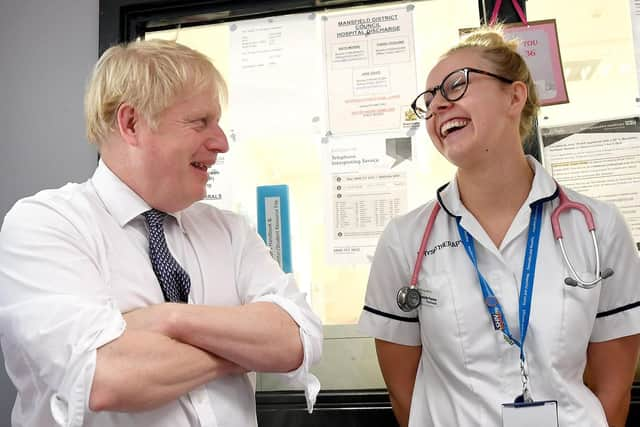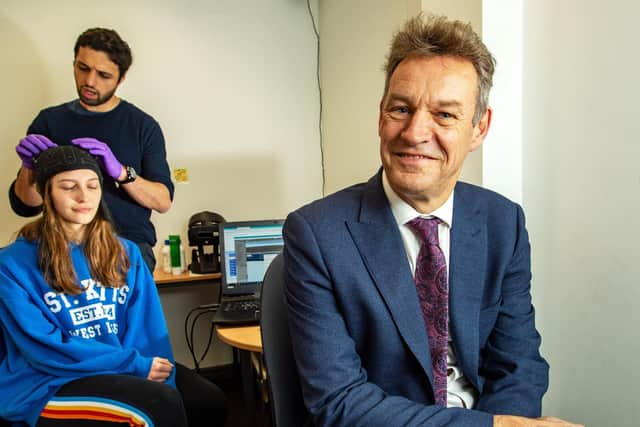End research funds gap to level up UK, northern health chiefs urge Boris Johnson
and live on Freeview channel 276
A letter to Boris Johnson signed by 22 of the region's hospital chief executives and university medical school heads says just £21 is spent per person on health innovation and research in the North compared to a £62 average in the so-called 'golden triangle' of London, Oxford and Cambridge.
In a challenge to the PM's levelling-up agenda, they argue that this lack of investment helps drive health inequalities which are holding back the northern economy and cost the UK billions of pounds each year in lost productivity.
Advertisement
Hide AdAdvertisement
Hide Ad

The letter, seen by The Yorkshire Post, says the North has more universities in the world top 250 than Italy, Spain and France combined as well as "exceptional hospitals and proven strengths in health innovation".
And it adds: "There is huge potential to support economic growth through working with innovators to address the needs of patients, support the creation of jobs and drive inward investment.
"Our organisations are the anchor institutions in our cities and regional economise and, with health innovation investment, we can help in levelling up the North."
It comes in a week that a landmark report by Professor Sir Michael Marmot warned that health inequalities were widening between the most and least deprived parts of the country, while a rise in life expectancy had "slowed dramatically" since 2010.
Advertisement
Hide AdAdvertisement
Hide Ad

Poor health accounts for one third of the productivity gap between the North and the rest of the UK, at a cost of £13.2bn a year, according to the Northern Health Science Alliance which brings together research intensive universities and NHS teaching trusts.
Funding more cutting-edge research in the North would benefit the region by bringing the latest health technology so it could benefit local patients first. And creating new jobs on the back of research work would boost the northern economy, ultimately leading to a healthier population.
Professor Paul Stewart, the Executive Dean of the Faculty of Medicine & Health at the University of Leeds, said experts in the city were already at the forefront of efforts to develop new health technology to benefit patients.
But he said: "What saddens me even in Leeds is that I can go from watching a Test Match in Headingley two miles north of this university to Hunslet two miles south and there's a 10-year difference in life expectancy.
Advertisement
Hide AdAdvertisement
Hide Ad"So as we start to unpick those, my view is that we're probably going to need innovative technologies in order to try and overcome this."
A Department of Health and Social Care spokeswoman said: “We want to level up people’s opportunity to have a long and healthy life, whoever they are, wherever they live and whatever their background or social circumstances. That’s why our NHS Long Term Plan, backed by an extra £33.9 billion puts tackling inequalities at its heart.
“Our approach means integrating good health into housing, transport, education, welfare and the economy because we all know preventing ill health – mental and physical – is about more than just healthcare.”
Northern leaders' letter to the PM in full
Dear Prime Minister,
We call upon you to invest properly in health research in the North of England.
Advertisement
Hide AdAdvertisement
Hide AdJust £21 is spent per person on health innovation and research in the North compared to a £62 average in London, Oxford and Cambridge. This lack of investment helps to perpetuate health inequalities.
Poor health accounts for one third of the productivity gap between the North and the rest of the UK, at a cost of £13.2bn a year. Analysis by the Northern Health Science Alliance shows that this situation is getting worse and the gap is widening year-on-year as investment is increasingly centralised in the South East.
The North of England has more world top 250 universities than Italy, Spain and France combined, exceptional NHS hospitals and proven strengths in health innovation.
There is huge potential to support economic growth through working with innovators to address the needs of patients, support the creation of jobs and drive inward investment.
Advertisement
Hide AdAdvertisement
Hide AdOur organisations are the anchor institutions in our cities and regional economies and, with health innovation investment, we can help in levelling up the North.
Yours sincerely,
Dr Séamus O’Neill Chief Executive Northern Health Science Alliance
Professor David Burn Chair of NHSA and Pro-Vice-Chancellor of the Faculty of Medical Sciences, Newcastle University
Dame Jackie Daniel Chief Executive Newcastle upon Tyne Hospitals NHS FT
Advertisement
Hide AdAdvertisement
Hide AdProfessor Paul Stewart, Executive Dean of the Faculty of Medicine & Health and Dean of the Medical School at the University of Leeds.
Dr Liz Mear Chief Executive The Innovation Agency (AHSN for the North West Coast
Professor Graham M Lord Vice-President & Dean Faculty of Biology, Medicine and Health University of Manchester and Director Manchester Academic Health Science Centre
Professor Carol Holland Deputy Dean Faculty of Health and Medicine Lancaster University
Advertisement
Hide AdAdvertisement
Hide AdRichard Stubbs Chief Executive Yorkshire & Humber Academic Health Science Network
Karen Partington Chief Executive Lancashire Teaching Hospitals
Professor Alison Metcalfe, Pro Vice Chancellor for Learning and Teaching and for the College of Health, Wellbeing and Life-sciences, Sheffield Hallam University
Steve Warburton, Chief Executive Liverpool University Hospitals NHS Foundation Trust
Advertisement
Hide AdAdvertisement
Hide AdProfessor Amanda Ellison Director Wolfson Research Institute for Health and Wellbeing Durham University
Dr Nav Ahluwalia, Executive Medical Director and Director of Research Rotherham Doncaster and South Humber NHS Foundation Trust
Professor Louise Kenny, Executive Pro-Vice-Chancellor Faculty of Health & Life Sciences, University of Liverpool
Professor StJohn Crean Pro Vice Chancellor (Research, Innovation and Enterprise) Professor of Medicine in Dentistry, Consultant Oral and Maxillofacial Surgeon University of Central Lancashire
Advertisement
Hide AdAdvertisement
Hide AdDr Nicola Wesley Interim Chief Executive Officer Academic Health Science Network North East North Cumbria
Dr Ben Bridgewater Chief Executive Health Innovation Manchester
Professor Karen Bloor, Professor of Health Economics and Policy, and University of York Research Champion for Health and Wellbeing.
Julian Hartley, Chief Executive, Leeds Teaching Hospitals
Sir Mike Deegan, Chief Executive, Manchester University NHS Foundation Trust
Advertisement
Hide AdAdvertisement
Hide AdElizabeth Moody, Executive Director of Nursing and Governance & Deputy Chief Executive Tees Esk & Wear Valleys NHS Trust
Professor Chris Newman Interim Vice-President for the Faculty of Medicine, Dentistry and Health, University of Sheffield.
Health research in numbers:
Totals for combined research funding 2018 in the UK
Yorkshire 4.6 per cent
Leeds 1.9 per cent
Sheffield 1.4 per cent
Manchester 3.5 per cent
Liverpool 2.6 per cent
North West 6.5 per cent
North East 2.5 per cent
Newcastle 2.2 per cent
London 31.8 per cent
Cambridge 13.3 per cent
Oxford 10.7 per cent
South East 14.9 per cent
East 14.3 per cent
Source: The 2020 UK Health Research Analysis Report
